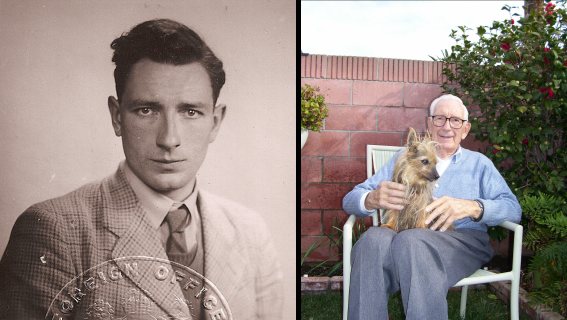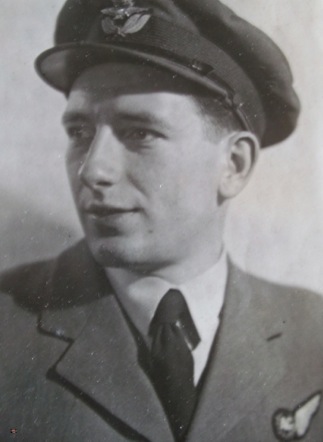Acting Squadron Leader John Coller D.F.C. D.S.O
Former Air Gunner 10 Squadron R.A.F.V.R.
Died: January 2011 Age 89.

Information kindly supplied by Virginia McCammon and Jualene Tapp - written by John Collier:
"After the war started and England was threatened by the German forces which had over-run most of Europe, I enlisted in the R.A.F.V.R.[Volunteer Reserve] applying for a pilot career, passing the necessary tests for Math and general I.Q. stuff.
There was a shortage of navigators, bombardiers and Radio operators, and at that time they did not want to accept any trainee pilots. So it was a matter of “take it or leave it!” sort of thing. I wanted to get started.
Of course I was terribly disappointed at being turned down for pilot, but wishing to get involved I took the radio operator’s job and headed out to “Boot Camp”,(basic training), Indoctrination and lots of P.E.
The next phase in the training of an airman in the R.A.F.in the specialty for which I enlisted, was Radio School. This was carried out at Yatesbury in Wiltshire, Southern England.
We had ground school and airborne training, getting accustomed to the equipment on the ground and in the air. Minimum passing grade for Morse code, sending and receiving was 22 words per minute, no exceptions. Trouble-shooting the radios and aircraft electrical systems was another important area of training we had to excel in. Tests and passing grades were mandatory.
Next basic course was gunnery training. We had to master the assembly and dis-assembly of Browning Machine guns in the dark, including repair of jammed equipment, and we had air to air gunnery practice, firing at drogue targets from the back seats of open cockpit planes at an airfield in southern Scotland.
Having successfully completed our basic training. Boot Camp, Radio School and Gunnery School, we were told to report to Kinloss, a base in Northern Scotland for O.T.U.[Operational Training Unit] for several months of training in coordination with other crew members for the first time. This was a northern base, not far from Inverness, and in Winter time it was the coldest climate I had ever been in.
After several weeks at the O.T.U. we were assigned to operational squadrons in Yorkshire for further training and eventually we started operations bombing targets in Germany and France. This was the start of serious and dangerous bombing flights over enemy territory and exposed us for the first time to the hazards of enemy fighters and anti aircraft fire.
There were plenty of close calls in my first tour of operations (25 missions) but I shall not get into them here.
See: 01/02 June 1942
See: 10/11 April 1944
After the first tour was complete we were sent to a special school as instructors to teach new enlistees what to expect when they arrived on an operational base and to offer whatever training they needed. This included all types of instruction, from piloting to radio operating, navigating to bombing accuracy.
We returned to active duty over enemy targets after about 3 months of this type of work training new crews how to work together and generally improve their effectiveness. Sometimes this might include flying 2nd pilot on night training missions in 4 engined bombers when instructors were scarce, or flying as Safety Radio Operator for trainees on X-country trips for familiarisation purposes.
The second tour of operations was much tougher than the first because the enemy had improved their skills at bringing us down by fighter and by radar controlled anti-aircraft fire. We endured some heavy losses.
In a raid on Nürnberg, for example, which I participated in, we lost 100 bombers and it was not too unusual to fly home and find that half of the aircraft on your squadron had gone missing that night. The average crew complement was 6 crewmen, you do the maths. It’s hard to train people fast enough to replace that rate of losses, not to mention the loss of aircraft.
I almost completed my second tour of 25 missions when I had an accident on base which put me in hospital for two years but probably also saved my life, because it ended my flying career in the R.A.F.
I started as most did, the lowest form of airman when I volunteered. My rank upon being honourably discharged from the Service was Acting Squadron Leader and I was summoned to Buckingham Palace for an investiture twice, before King George Vl of England when I received the Distinguished Flying Cross and later the Distinguished Service Order for my work in the R.A.F Bomber Command."
John Coller.
